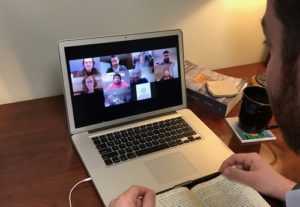THE SOLUTION TO PASTOR BURN OUT
April 28, 2021 2024-05-10 13:07THE SOLUTION TO PASTOR BURN OUT
The following was transcribed from “The Longevity of Volunteers and Pastors” podcast, published September 15, 2017
Eric: In our staff meeting this week we were discussing a law about when you come across a nest and it has eggs or hatchlings in it and the mother bird is there. The law covers what you’re supposed to do. We started discussing it with questions like, “What’s going on here?” “What’s the principle?” “Why is this in scripture?“ So let’s talk about it. Let’s start first off by talking about our approach to Torah and the law. When we’re coming across this law, rather than looking at the text as the letter of the law that we’re going to apply directly, we’re going to ask ourselves, “What’s the principle at play here?”. This is a case study or an expression of some principle. Because of this, I want to ask what the principle behind this text is. Then, we’ll talk about how you apply that principle.
 Scott: We’ve covered this before on three other podcasts: ‘Tattooing’, ‘The Law Will Blow Your Mind’, and ‘Charlottesville, Diversity, and an Ox Law’.
Scott: We’ve covered this before on three other podcasts: ‘Tattooing’, ‘The Law Will Blow Your Mind’, and ‘Charlottesville, Diversity, and an Ox Law’.
Dan: Let’s look at this Deuteronomy 20:6-7 law: “If you come across a bird’s nest beside the road, either in a tree or on the ground, and the mother is sitting on the young or on the eggs, do not take the mother with the young. You may take the young, but be sure to let the mother go, so that it may go well with you and you may have a long life”.
Scott: The first task here is to get to the specifics, to make sure we understand the scenario. You’ve come across a mother bird on a nest and she has either young that she’s sitting on or eggs she’s sitting on and it says you’re allowed to take the young. So, what does that mean? Am I supposed to leave the eggs? What’s going on here?
Eric: Let’s look at it. Translations differ. Some are more clear than others but, in the Hebrew, you’re dealing with three different terms. You have a word for ‘eggs’, a word for ‘hatchlings’ or ‘newly hatched young birds’, and then then there’s a sort of a catch-all term for ‘the young, the mothers young, and any offspring’. So what the text is saying, is you can take the offspring (whether it’s eggs or hatchlings) but you need to shoo away the mom.

Scott: Now, if I’m living in a city and I never come across a mother bird and young, I am clearly never in danger of breaking this law. Right?
Eric: Well, you’re probably never in danger of breaking the letter of the law, but we’re trying to get to with the principle here. So, why would I shoo away the mom to take the young? What we talked about in the staff meeting was that we are dealing with a long view and not a short, immediate view. We’re clued into that because it says “so that you may have a long life”. So, we’re clued into the fact that we’re talking about sustainability in the land. So how does this contribute to sustainability? Well, the mom has made it through that winnowing phase where most young don’t make it into adulthood. This mother has proven that she can survive,she can make it, and she can reproduce. Because she’s a proven resource for the land, let her go. However, you can take the young because that’s built into the natural process. The natural process that the overwhelming majority of young will not make it.
Scott: So what we’re saying is, there’s this principle of having a long term view towards your resources. So, the case law is essentially to imagine a scenario where a guy’s walking through the woods and he comes across a nest with the mom on it. The appropriate response here is to shoo away the mother and then take the young. When you’re in the land and you’re looking for food, or when you’re in the position of need, don’t be stupid or shortsighted about it.
Eric: So, this idea of not being shortsighted with your resources, this could pertain to financial matters, or those kinds of things. Back to our staff meeting, where we went in our conversation of this law was to how the church handles their volunteers and their staff. How they handle their human resources. So, how do we, as a church, get out of the tyranny of the urgent and into a long term view of our human resources?
Scott: In this law, the tyranny of the urgent is a guy who’s hungry, so he’s going to the woods to look for some food. So I see it as- ‘don’t let your hunger overtake you and eat the mother because that’s stupid. If you do, the mother will never produce for you again. Instead, have a longer view of this whole thing’. So church this out. How do we deal with this with people? Do we have a long term view of people? Eric: Dan, you mentioned some of the things your church did to help take a long term view towards your sustainability in ministry.
Dan: Yes, there are a couple sides to this that we talked about, in terms of applicational uses. We first looked at what the church (in general) does with human resources and how they should expand their energy from focusing on things in the near term and overstressing/working them rather than caring for their health. Then, I think we moved pretty quickly to how a church would or would not take care of their pastor and help turn what the pastor does in the day to day thing that’s unsustainable into something that’s sustainable in the long term. In reality, we know the shelf life, statistically for pastors, is not long. We have a hunch that some of the reason has to do with a violation of this law .

Eric: The average tenure in ministry is four years.
Scott: So let’s talk about the volunteer side. What does it look like? What does breaking this law look like on the volunteer side?
Eric: The most common thing I see is, as a church, we have these immediate urgent needs to be met, whether it’s the youth event that we are having, the ushers we need, the volunteers we need for an event, or the volunteers for passing out communion…the laundry list of things you’re trying to accomplish can be long. The question becomes, are we willing to store away a certain number of hours solely for the purpose of developing those volunteers? In the church world this would require saying no to a lot of good things.
Scott: So the renewable side of the volunteer. I’ve been at a church where I’ve seen this played out; where they say they have no one left. They’ve just burned out all their human resources and they’re in a position now where they want to start developing more people, but now they can’t because no one is currently developed correctly so that they can develop other people. Also, whoever you would otherwise call upon (besides the fact that they’re not developed), they’re burned out so now you’re sitting there in a parched land, depleted of it’s resources.
Eric: That reminds me of a conversation I had with an elder of a church in the Chicagoland area. He told me that, rather than having 20 year developed leaders, they had one year old christians 20 times over. In other words, they had people that had been there for 20 years, but never really developed beyond what you expect in the first year of spiritual growth. This is because the systems they had in place were just set up to use them over and over and over again without considering any long term view term of discipleship. No consideration of how they were going to grow these people up, spiritually.
Dan: Looking back on my own experiences as a pastor, I find this quite convicting as well. In some ways I probably didn’t handle caring for volunteers well. It just seemed to be that there was so much need.
Scott: I think a good way to address the issue is the idea of raw, deep discipleship… and there’s no shortcut. You have to commit to the long-term sustainability of the human resources you have in your church. You’re not gonna grow a 20 year old tree in six months. You just have to commit to the fact that it’s gonna take 20 years to get to this 20 year Christian. You’ve got to start doing it now instead of continuing to extract from them for 10 or 15 years. We have to ask, where do I want my church to be in 10 or 15 years? I see these people in my community and I’m going to start pouring into them now, because it’s essentially planting trees and watering them for old age and long life.
Dan: So what sorts of things would a church say “no” to in order to give time to that growth? What have you seen? Have you seen this done well in places?
Eric: I haven’t seen it done well, but I will say that I’ve seen it done above average. One church comes to mind that has a very intentional and, I would say somewhat rigorous, disciple making program. In this case it’s only one year, so I’m not talking about some extended 20 year thing. It’s one year where people who really want to grow and be invested in have the opportunity. At this church, they go through a year of meeting two evenings a week. They have service projects as part of it as well. There’s some instruction in terms of getting into scripture and getting some tools for how to handle scripture, but there’s also a lot of just life issues and growth issues. Then the whole group goes on a missions project at the end of the months that they’re together. That’s not the whole package, but that’s an example of a piece that can be incorporated into what you might be doing.
Scott: It sounds to me like a leadership issue. The leadership has to have a value that’s constantly overseeing the daily ins and outs of the business of the church with an eye, instead of towards the urgent (hey, we have to make sure we have enough volunteers for this), towards the long term (hey, I need to have mature christians in 10 years).
Dan: The pressure would be felt as well from folks who are asking for certain kinds of ministries; certain kinds of things that are more shortsighted.

Scott: The thing about this law that is fascinating to me is the fact that it is illegal to have a short term view according to Torah . It is counter to the heart of God to have a short term view- to expend your resources so that you burn it all out. The use of all your resources is illegal and counter Torah . It’s mind blowing! (I really do like the link between Torah and wisdom here…but we don’t have time to get into that.) The second thing I think we can talk about in terms of leadership is not just the pastoral leadership, but those who surround the pastor and those who determine how the leadership in the church gets treated. In a long-term view, it speaks to the care and feeding of the pastor. The pastor, who is supposed to maintain this vision in Torah, finds himself in a church that has this view of a pastor that he needs to solve the church’s problems in a few months…that church is gonna kill him. They’re going to burn out the pastor.
Eric: This is where we at Pillar have a little more to say, because what we do day in and day out is work with pastors like this. I would say that typically what we see is a scenario where the pastor said that they wanted to grow and develop and get more tools in their tool belt for the longevity of their ministry, but are generally not supported by their churches in that endeavor.
Scott: To be clear, we have had pastors who have gone to their church and said, “I want to take classes two hours a week and be poured into” and their church has actually said, “do that on your own time.” This has actually happened on more than one occasion and the issue here is not whether they’re coming to us at Pillar or somewhere else for their training, the issue is an ethos; this air in the church that says, “No, your issue is the busy, the urgent. We are paying you to do these tasks. Develop yourself on your own time.” Your self development is the ‘releasing the mother, just take the young’ type of thing. It’s planning for the future, not the tyranny of the urgent. You need the mother to be able to reproduce over and over and over again. That means the responsibility lies on the people who are using the pastor as a resource to figure out how to make sure that the pastor is renewable. So, if you’re the pastor, you need to figure out; you need to have a central view, “How do I grow and maintain these volunteers as renewable? And the other way would look like the eldership over a pastor would say, “How do I grow and maintain this pastor?”
Dan: My former church did this well. They had measures in place to take good care of me. They gave me time built into my contract for continuing education every year. I didn’t have to take vacation time for that. It was part of my job and I didn’t have to take my own time for that. They also gave me time for regular retreat days for strategic thinking, planning, and looking forward. They gave me time for study leave. They treated me as a renewable resource in a lot of ways.
Scott: When they were hiring you they had the mindset of, “How can we make room to help this guy grow and be built up so that we can have him for the next 15 years?” Rather than, “How much can we squeeze out of him for the next five years? and, God willing, if he’s Superman he can survive it for 10.” That’s illegal treatment of any resource and it’s utterly stupid. That’s your leadership! Why would you do that?
Eric: What I’ve become more and more convicted about, of late, is that I am zealous for the Lord’s reputation; for his renown in a community. He has chosen to display himself through his people and his people in our culture. His people gather in their local churches and those local churches need to be vibrant; representing the Lord well in their communities. We’re only going to have vibrant churches if we have vibrant leadership and we’re only going to have vibrant leadership if we have a long-term view towards investing in the pastors; giving them those resources like you were talking about. We not only need to have a budget that allows them to continue to develop themselves but also the time. We did a podcast actually (Essential First Steps For Successful Ministry) just about developing yourself.

Dan: Let me interject. My experience was largely positive with this but, with other pastors in our particular denomination and district (and all over) I get the sense that we are preaching to the choir here, in terms of pastors and ministers who may be listening. Every pastor knows they need this and I think most everyone of them understands that this principle is being violated in the way they’re being handled, treated, and taken care of. However, I think it’s such a strange dynamic that most would also not feel the freedom to bring something like this up to their elder boards or the congregation. They may feel guilty about wondering if this is something that they do need or deserve. It’s such a strange kind of culture governing pastoral behavior.
Scott: But the other part of this is, a lot of times what’s lacking is an understanding and appreciation of Torah- the heart of God in life circumstances. You need to be trained to know that stuff. Someone has to help you understand. If you didn’t understand… if you just felt like you were being raked over the coals and knew this wasn’t really helping you long-term but I didn’t know why…you would need to be able to understand God’s perspective; Torah. You would need yourself or someone elst to be able to say, “guys, you’re killing the mama hen and all the younger at once here, and that’s counter to God. There is a law about that. There is a biblical text that says that the way that we are treating our pastors or the way that you are treating me or the way that I am treating our volunteers is wrong. And here’s how I know it’s wrong…” So, know Torah and get your congregation to know and live Torah. I think some of the stuff, the circumstantial stuff, will begin to present itself as they process and say, “hey wait a minute, our pastor said we’re not treating our volunteers correctly, but I was thinking about how we’re treating our pastor and I don’t think that adds up.”

Dan: Don’t get the impression that we don’t understand that on the ground things are complex. We do understand that. We don’t need to oversimplify anybody’s situation, but we appreciate the complexity. This is something worth the struggle and worth the sacrifice of the short term to think about this in such a way that maybe you bake this into your values…not really maybe, you should. We’re suggesting that, even though it may seem unfeasible to even think about this, it’s worth the work. It’s a violation against God’s heart not to do this work. It’s for the good of the long-term, for the sustainability of the church, for the glory of God… all of this.
Eric: We are on the side of the pastor and that’s something we want to emphasize, even though we get hyperbolic and simplify things. But that’s what we’re after- supporting the pastors and seeing pastors thrive.
Related Posts
The New Testament in Color
Exploring Revelation with Dr. Dan Morrison
Kingship in the Psalms with Dr. Beth Currier
Search
Popular Tags





